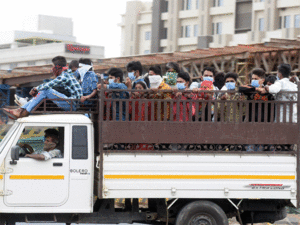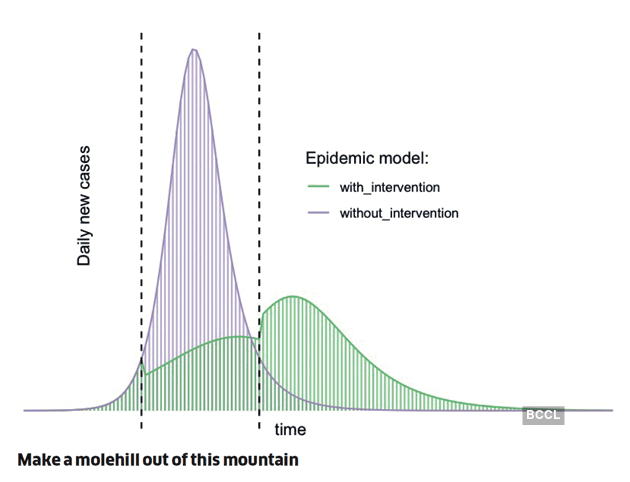
The current dataset on the coronavirus situation in India is inadequate.

By Kiran Mazumdar-Shaw
India needs to promptly start epidemiological data collection and analysis to fine-tune its response to the Covid-19 outbreak, flatten the curve and avoid interventions that may turn out to be unnecessarily costly for the nation.
The current dataset on the coronavirus situation in India is inadequate.
This is because like most countries, including the US, India currently lacks the ability to test a large number of people. In the days to come, GoI will need to extract actionable intelligence from data for effective decision-making.
Will short-term extreme social distancing help? How long should lockdown measures be kept in place? Can the Indian summer play saviour? Do Indians have inherently better immunity? Is the viral strain less virulent? Does India have an advantage because it has among the youngest populations in an ageing world?

Mix and Match
We will need to collect a large patient dataset and analyse the data thoroughly to generate critical insights that can answer these important questions.
The 21-day lockdown announced by the government provides us with a great opportunity to generate this data.
Data collected so far suggests that though the number of people infected by Covid-19 is on the rise in India, the severity of the disease seems manageable and deaths are low. Data available as of March 29 showed about 990 confirmed cases in India, with total deaths per one million population at 0.02. Also, about 85 patients in India have recovered, which currently puts the recovery rate at 9%. If this trend continues as the number of infections grow, there is hope that our hospitals will not get overwhelmed.
In the next 15 days, we will need to convert big government hospitals into dedicated Covid-19 facilities, as well as create isolation zones for patients who are found to be Covid-19-positive.
There are about 714,000 government hospital beds available in India, amounting to 0.55 beds per 1,000 population. Given the shortage of hospital beds, GoI should convert hotels into quarantine-nursing homes.
These temporary quarantine zones should be used to house those Covid-19-positive cases who are asymptomatic or have mild symptoms. These patients need to be monitored 24×7, provided nursing care and teleconsultation for 2-3 weeks. They need to be tested every week and released if they test negative three consecutive times.
If any of these patients’ conditions takes a turn for the worse, they should be immediately moved to a dedicated Covid-19 hospital with intensive care unit (ICU) care and ventilator facilities. This model of treatment will help ease the pressure on existing healthcare infrastructure.
It will also enable us to generate a lot of data on the severity of the disease.
India has done reasonably well on most counts: airport screening, quarantining, public awareness and effecting a lockdown. However, a lot more needs to be done when it comes to testing. A total of 26,798 individuals had been tested for Covid-19 till March 27, according to Indian Council of Medical Research (ICMR) data.
We need to scale up testing rapidly.
Since diagnostic kits are still in short supply, we should prioritise who can take the test according to the following criteria:
- All quarantined persons.
- All health workers treating Covid-19 patients.
- All persons carrying out essential services and working in essential sector industries.
- Random sampling of slums and rural communities to see if there is community spread.
- Employees returning to work after the lockdown must be tested before they resume their duties.
Guiding Light
Over the coming days and months, GoI will need to start serological testing to make accurate public health decisions about when, and how, to lift the lockdown and ease strict social distancing regulations. Data from these tests will also help determine the potential threat from any subsequent waves of Covid-19 outbreak.
Serological testing is used to detect antibodies in the blood to identify the real number of people in a population who have come in contact with the virus. If the testing on enough representative people across the country reveals, for example, that 60% or more of the population has got antibodies to the Covid-19 virus, then it would mean they have already had the infection, and India as a country has developed ‘herd immunity’ against the disease, lowering the danger of it spreading uncontrollably through the population. This will give GoI akey data matrix to hopefully give us a‘coast is clear’ by mid-May.
Biotech companies in India are already making probes & primers needed for diagnostic kits. India can exponentially step up the production of low-cost antibody and PCR (polymerase chain reaction) kits if ICMR can supply the following: extracted RNA (ribonucleic acid) from Covid-19, serum sample of convalesced patients, and human positive controls.
As we prepare for the long haul, data will play a key role in fighting this pandemic.
The writer is chairperson-managing director, Biocon
Source: indiatimes.com

